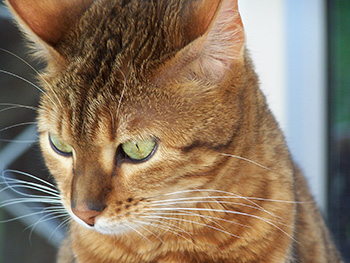
In the last in our series of blogs about pet heart disease, we take a look at cats.
Like dogs and humans, cats can also suffer from heart disease. Like many diseases in cats, it is possible for your feline friend to have a heart problem and for you to be completely unaware.
A common situation for cat owners to find themselves in is the vet saying that their cat has a heart murmur. This is usually picked up incidentally when your cat comes in for a routine check-up and is heard by your vet when he or she listens to your cat’s heart with a stethoscope. A heart murmur is an abnormal noise, caused by turbulent blood flow within the heart or the large vessels exiting from the heart. It is always worrying to be told there is something ‘wrong’ with your beloved pet, but fortunately a heart murmur alone does not necessarily mean a problem for your cat.
Frustratingly for us, some cats can have severe heart conditions with a normal sounding heart, which can make it difficult to know that something is wrong until late in the disease process. This happened with Greenbay owners John and Laura’s own cat, Neema, pictured above.
What can cause the heart murmur?
- Young kittens can have ‘innocent’ flow murmurs, which disappear as the kitten gets older. Occasionally a murmur heard in a kitten may indicate a problem with the heart e.g. a ‘hole in the heart’.
- Anaemia (low red blood cell count) can cause a murmur, due to thinning of the blood.
- Some adult cats can have murmurs which are of no concern for the cat – these are called ‘physiological murmurs’.
- A murmur can be associated with other health problems e.g. high blood pressure or an overactive thyroid gland.
- Unfortunately a murmur can also indicate a serious heart problem called cardiomyopathy, more on this later.
If a murmur is detected…
The vet will check your cat over and ask questions to see if there are any signs of heart disease or other health problems. To establish the exact cause of a murmur involves further tests e.g. blood tests, blood pressure monitoring and imaging of the heart, usually with an ultrasound. Alternatively, if the cat is well, an owner may choose to have their cat monitored initially.
If the vet hears an abnormal heart rhythm as well as a murmur, or on it’s own, this is more likely to indicate a significant heart problem.
If your cat is known to have cardiomyopathy it does affect the choices when it comes to a general anaesthetic, so the vet may recommend an ultrasound scan prior to an anaesthetic if your cat has a heart murmur.
Cardiomyopathy in cats
Unfortunately cats can suffer from a potentially severe disease of the heart muscle, known as cardiomyopathy. Unlike dogs, it is rare for them to suffer from disease of the heart valves. There are different forms of cardiomyopathy in cats, but the most common is called hypertrophic cardiomyopathy (HCM), where the heart muscle is abnormally thickened. In this form of the disease the heart cannot fill with blood properly between pumps.
Cardiomyopathy can also occur secondary to other diseases e.g. an overactive thyroid gland, or high blood pressure.
Cardiomyopathy is usually diagnosed with an ultrasound of the heart. Although a small area of skin usually needs to be shaved to perform ultrasound, the procedure is not uncomfortable or painful and so can be performed in most cats without any sedation or anaesthetic.
Signs of heart disease in cats with cardiomyopathy
Early on in the disease, the cat will appear normal. In some cats the progression of the disease is slow and they may never actually get ill from their heart problem. Sadly, however, a proportion of cats will go on to suffer symptoms as a result of their heart problem.
The vet may be able to detect signs of a problem before you do, which is one of the reasons we advise all cats are checked at least once a year by a vet. Early warning signs may include a heart murmur, abnormal heart rate, or abnormal heart rhythm.
If the heart is significantly affected the cat may show signs of heart failure. Sadly, this can happen with little or no warning. The early signs of reduced ability to exercise, that we see in dogs, are often missed in cats as they sleep a lot anyway and don’t go for walks. The most common sign is difficulty breathing (fast breathing, increased breathing effort and panting). Cats with the disease can also collapse or develop a blood clot within the heart.
Treatment of heart disease in cats
If the heart murmur is secondary to something else e.g. an overactive thyroid gland, treatment of the underlying disease will usually resolve the heart issue.
Unfortunately there are no treatments shown to slow down the progression of primary HCM. Where heart failure develops, various drug treatments are available to help improve and manage the condition, but sadly many cats succumb to the disease quite soon.
If there are changes consistent with cardiomyopathy on an ultrasound scan, even if your cat appears normal, the vet may suggest using drugs to try and prevent a blood clot forming, but there is currently no proven evidence whether this will help. Knowing about the disease can also help guide decisions about anaesthesia or treatment for other conditions, and allow your cat to be closely monitored.
Dr Laura Mather, Vet at Greenbay Vets in Torquay and Paignton[/vc_column_text][/vc_column][/vc_row]
